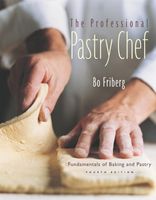Advertisement
Artificial sweetener
Appears in
By Bo Friberg
Published 1989
Artificial sweeteners are not used to a large extent in the majority of restaurant dessert kitchens or pastry shops other than those specializing in sugar-free or diabetic products. There are occasions, however, when the pastry department is asked to produce something for a special occasion or for a particular customer with dietary restrictions, where, for one reason or another, the instructions preclude the use of sugar. Certainly some recipes are much easier to modify than others. If the item will not be cooked, aspartame, which is readily available, can be used to sweeten a sauce, a finished custard or a whipped topping, but it cannot be used for baking. Aspartame is anywhere from 150 to 200 times sweeter than granulated sugar, so obviously a much smaller amount is used when substituting it for granulated sugar. Many new sugar substitutes have become available in the last few years due in part to the recent interest in low-carbohydrate diets. Many of these substitutes can be used for cooking and baking with very good results. Other artificial sweeteners, some of which are no longer used, include saccharin, cyclamates, and stevioside.


